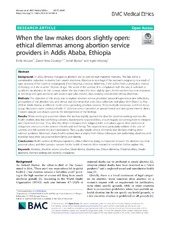| dc.contributor.author | McLean, Emily | en_US |
| dc.contributor.author | Desalegn, Dawit Nima | en_US |
| dc.contributor.author | Blystad, Astrid | en_US |
| dc.contributor.author | Miljeteig, Ingrid | en_US |
| dc.date.accessioned | 2020-03-30T08:15:09Z | |
| dc.date.available | 2020-03-30T08:15:09Z | |
| dc.date.issued | 2019-09-05 | |
| dc.Published | Mclean E, Desalegn D, Blystad A, Miljeteig I. When the law makes doors slightly open: ethical dilemmas among abortion service providers in Addis Ababa, Ethiopia. BMC Medical Ethics. 2019;20:60 | eng |
| dc.identifier.issn | 1472-6939 | |
| dc.identifier.uri | https://hdl.handle.net/1956/21626 | |
| dc.description.abstract | Background: In 2005, Ethiopia changed its abortion law to curb its high maternal mortality. This has led to a considerable reduction in deaths from unsafe abortions. Abortion is now legal if the woman’s pregnancy is a result of rape or incest, if her health is endangered, if the fetus has a serious deformity, if she suffers from a physical or mental deficiency, or if she is under 18 years of age. The word of the woman, if in compliance with the law, is sufficient to qualify for an abortion. In this context, where the law makes the door slightly open, health workers become important in deciding who gets access to safe services and who doesn’t, thus creating considerable ethical dilemmas. Methods: The objective of this study was to explore abortion service providers’ personal experiences and reflections, perceptions of the abortion law, and ethical and dilemmas that arise. Data collection took place from March to May 2016 in Addis Ababa, at different health clinics providing abortion services. Thirty in-depth interviews and three focus group discussions were conducted with 41 abortion service providers at governmental and non-governmental clinics. Content analysis was drawn upon in the interpretation of the findings. Results: When working in a context where the law has slightly opened the door for abortion seeking women, the health workers describe conflicting concerns, burdensome responsibilities, and ambiguity concerning how to interpret and implement the law. They describe efforts to balance their religious faith and values against their professional obligations and concern for women’s health and well-being. This negotiation is particularly evident in the care of women who fall outside the law’s indications. They usually handle ethical dilemmas and decision-making alone without guidance. Moreover, many health workers face a stigma from fellow colleagues not performing abortions and therefore keep their job a secret from family and friends. Conclusions: Health workers in Ethiopia experience ethical dilemmas trying to maneuver between the abortion law, their personal values, and their genuine concern for the health of women. More research is needed to further explore this. | en_US |
| dc.language.iso | eng | eng |
| dc.publisher | BioMed Central (BMC) | eng |
| dc.rights | Attribution CC BY | eng |
| dc.rights.uri | http://creativecommons.org/licenses/by/4.0/ | eng |
| dc.subject | Abortion | eng |
| dc.subject | Abortion service providers | eng |
| dc.subject | Moral distress | eng |
| dc.subject | Abortion law | eng |
| dc.subject | Ethical dilemmas | eng |
| dc.subject | Empirical ethics | eng |
| dc.subject | Unsafe abortions | eng |
| dc.subject | Women seeking safe abortion | eng |
| dc.subject | Inequalities | eng |
| dc.title | When the law makes doors slightly open: ethical dilemmas among abortion service providers in Addis Ababa, Ethiopia | en_US |
| dc.type | Peer reviewed | |
| dc.type | Journal article | |
| dc.date.updated | 2020-01-20T12:23:45Z | |
| dc.description.version | publishedVersion | en_US |
| dc.rights.holder | Copyright 2019 The Author(s) | |
| dc.identifier.doi | https://doi.org/10.1186/s12910-019-0396-4 | |
| dc.identifier.cristin | 1777761 | |
| dc.source.journal | BMC Medical Ethics | |

